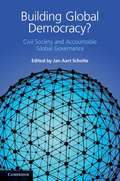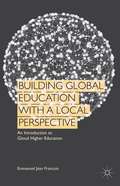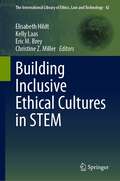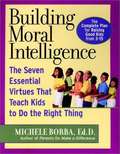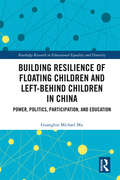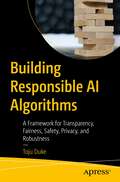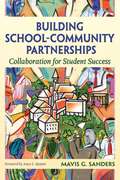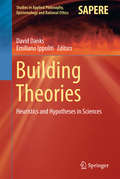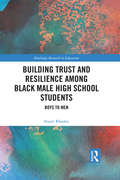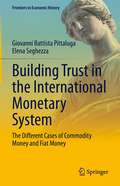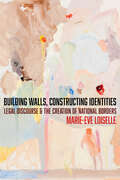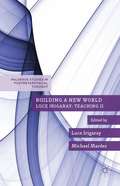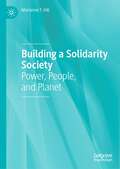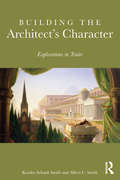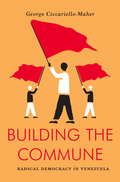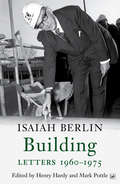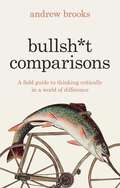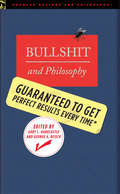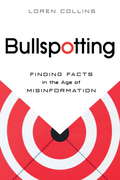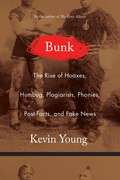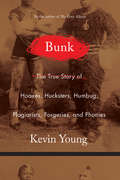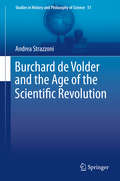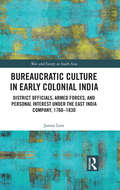- Table View
- List View
Building Global Democracy? Civil Society and Accountable Global Governance
by Jan Aart ScholteThe scale, effectiveness and legitimacy of global governance lag far behind the world's needs. This path-breaking book examines how far civil society involvement provides an answer to these problems. Does civil society make global governance more democratic? Have citizen action groups raised the accountability of global bodies that deal with challenges such as climate change, financial crises, conflict, disease and inequality? What circumstances have promoted (or blocked) civil society efforts to make global governance institutions more democratically accountable? What could improve these outcomes in the future? The authors base their argument on studies of thirteen global institutions, including the UN, G8, WTO, ICANN and IMF. Specialists from around the world critically assess what has and has not worked in efforts to make global bodies answer to publics as well as states. Combining intellectual depth and political relevance, Building Global Democracy? will appeal to students, researchers, activists and policymakers.
Building Global Education with a Local Perspective
by Emmanuel Jean FrancoisBuilding Global Education with a Local Perspective introduces the concepts, theories, and practices associated with glocal higher education, based on the ideas of "think globally, act locally", and "think locally, act globally". Jean Francois' outline of glocal higher education suggests frameworks that can serve as alternatives to the limitations of the imperialist ambitions of global education. Using templates, case studies, illustrations, and activities, Jean Francois challenges the critical thinking of scholars and policy makers, and suggest original strategies to plan and implement these programs and projects in international, comparative, and global education.
Building Inclusive Ethical Cultures in STEM (The International Library of Ethics, Law and Technology #42)
by Elisabeth Hildt Eric M. Brey Kelly Laas Christine Z. MillerThis book shares innovative approaches to effectively engage students and faculty working in research labs, lab-based classrooms and courses to build inclusive ethical cultures. The frameworks and approaches presented move beyond traditional research ethics training to strengthen the ethical culture in research labs. The chapters in the book showcase best practices and approaches to embedding educational interventions in courses, research labs and departments. The book is based on the two-day workshop “Building Inclusive Ethical Cultures in STEM” (April 23-24, 2021). Moving beyond the two-day conference that inspired this collected volume, the various chapters address questions like: What are approaches and tools to integrate ethics education in STEM effectively? How can STEM ethics education be improved? What can researchers do to build more inclusive research environments? How can meaningful discussions about ethics be effectively integrated into STEM courses, research labs, and workplace environments? While each chapter takes a different perspective and is located in its respective context, the contributions are united by the goal of effectively including ethical reflection in STEM education. Instructors from both four-year and two-year colleges who teach STEM and lab-based STEM courses; young principal investigators/junior faculty who are in the process of building their research groups; departmental chairs interested in programmatic approaches for improving mentoring, research ethics education, and the research culture of their department, will find this work to be a very valuable resource in their daily practice.
Building Moral Intelligence
by Michele BorbaGain a new understanding of moral intelligence, and a step-by-step program for its achievement from bestselling author, Michele Borba. In this indispensable book for parents, Borba has created a new break-through in conceptualizing and teaching virtue, character and values under the auspices of a measurable capacity -- Moral Intelligence. This book confronts the front-page crisis we now face in our country regarding youth violence, alienation, self-destructive behavior, cold-heartedness, lack of compassion, insensitivity, intolerance and the break down of values. The author provides a new way to understand, evaluate and inspire our kids with the seven essential virtues which comprise moral intelligence.
Building Resilience of Floating Children and Left-Behind Children in China: Power, Politics, Participation, and Education (Routledge Research in Educational Equality and Diversity)
by Guanglun Michael MuThe past two decades have seen exponential growth of urbanisation and migration in China. Emerging from this growth is a population of floating and left-behind children which is estimated to be approaching 100 million. Due to their increasing risks of undesirable educational and social, as well as health and psychological, outcomes, there is a great urgency to help floating children and left-behind children beat the odds. This book offers an analysis of how oscillations of government discourse have come to shape central and local educational policies regarding the schooling of these children. It also delves into child and youth resilience in this unique migration context, examining what can be done to build up resilience of floating and left-behind children. In this vein, the book will complement current knowledge and advance context- and culture-specific understandings of child and youth resilience through both school-based and community-based approaches. The book aims to answer a fundamental question: How to help floating children and left-behind children become responsive and resilient to structural deficiencies and dynamics in the migration context of China? This is important reading for scholars, school professionals, community workers, and policy makers to better address the social and educational resilience and wellbeing of floating and left-behind children.
Building Responsible AI Algorithms: A Framework for Transparency, Fairness, Safety, Privacy, and Robustness
by Toju DukeThis book introduces a Responsible AI framework and guides you through processes to apply at each stage of the machine learning (ML) life cycle, from problem definition to deployment, to reduce and mitigate the risks and harms found in artificial intelligence (AI) technologies. AI offers the ability to solve many problems today if implemented correctly and responsibly. This book helps you avoid negative impacts – that in some cases have caused loss of life – and develop models that are fair, transparent, safe, secure, and robust.The approach in this book raises your awareness of the missteps that can lead to negative outcomes in AI technologies and provides a Responsible AI framework to deliver responsible and ethical results in ML. It begins with an examination of the foundational elements of responsibility, principles, and data. Next comes guidance on implementation addressing issues such as fairness, transparency, safety, privacy, and robustness. The book helps you think responsibly while building AI and ML models and guides you through practical steps aimed at delivering responsible ML models, datasets, and products for your end users and customers. What You Will LearnBuild AI/ML models using Responsible AI frameworks and processesDocument information on your datasets and improve data qualityMeasure fairness metrics in ML modelsIdentify harms and risks per task and run safety evaluations on ML modelsCreate transparent AI/ML modelsDevelop Responsible AI principles and organizational guidelinesWho This Book Is ForAI and ML practitioners looking for guidance on building models that are fair, transparent, and ethical; those seeking awareness of the missteps that can lead to unintentional bias and harm from their AI algorithms; policy makers planning to craft laws, policies, and regulations that promote fairness and equity in automated algorithms
Building School-Community Partnerships: Collaboration for Student Success
by Mavis SandersThis current era of high stakes testing, accountability, and shrinking educational budgets demands that schools seek bold and innovative ways to build strong learning environments for all students. Community involvement is a powerful tool in generating resources that are essential for educational excellence. Building School-Community Partnerships: Collaboration for Student Success emphasizes the importance of community involvement for effective school functioning, student support and well-being, and community health and development. This sharp, insightful book serves as an excellent resource for educators seeking to establish school-community partnerships to achieve goals for their schools and the students, families, and communities they serve. Schools can collaborate with a wide variety of community partners to obtain the resources they need to achieve important goals for students’ learning. Some of these partners may include: - Businesses and corporations - Universities and other institutions of higher learning - National and local volunteer organizations - Social service agencies and health partners - Faith-based organizations and institutions Work successfully with community partners to improve school programs and curricula, strengthen families, and expand your students’ learning experiences!
Building Technology Transfer within Research Universities
by Thomas J. Allen Rory P. O'SheaFor the past number of years, academic entrepreneurship has become one of the most widely studied topics in the entrepreneurship literature. Yet, despite all the research that has been conducted to date, there has not been a systematic attempt to analyze critically the factors which lie behind successful business spin-offs from university research. In this book, a group of academic thought-leaders in the field of technology transfer examine a number of areas critical to the promotion of start-ups on campus. Through a series of case studies, they examine current policies, structures, program initiatives and practices of fourteen international universities to develop a theory of successful academic entrepreneurship, with the aim of helping other universities to enhance the quality of their university transfer programs. This book is a valuable resource for researchers and graduate students working on innovation, entrepreneurship and technology transfer, as well as senior managers and policymakers.
Building Theories: Heuristics and Hypotheses in Sciences (Studies in Applied Philosophy, Epistemology and Rational Ethics #41)
by Emiliano Ippoliti David DanksThis book explores new findings on the long-neglected topic of theory construction and discovery, and challenges the orthodox, current division of scientific development into discrete stages: the stage of generation of new hypotheses; the stage of collection of relevant data; the stage of justification of possible theories; and the final stage of selection from among equally confirmed theories. The chapters, written by leading researchers, offer an interdisciplinary perspective on various aspects of the processes by which theories rationally should, and descriptively are, built. They address issues such as the role of problem-solving and heuristic reasoning in theory-building; how inferences and models shape the pursuit of scientific knowledge; the relation between problem-solving and scientific discovery; the relative values of the syntactic, semantic, and pragmatic view of theories in understanding theory construction; and the relation between ampliative inferences, heuristic reasoning, and models as a means for building new theories and knowledge. Through detailed arguments and examinations, the volume collectively challenges the orthodox view's main tenets by characterizing the ways in which the different "stages" are logically, temporally, and psychologically intertwined. As a group, the chapters provide several attempts to answer long-standing questions about the possibility of a unified conceptual framework for building theories and formulating hypotheses.
Building Trust and Resilience among Black Male High School Students: Boys to Men (Routledge Research in Education #26)
by Stuart RhodenCentered on a case study of a mid-Atlantic charter school, this book identifies the key factors that help Black male students navigate high school in spite of traditional and historical barriers. Rather than examining their experiences through a deficit model, this book adds to the growing body of data on the importance of positive role models—including parents, peers, teachers, and administrators—in facilitating socio-emotional and academic success at the secondary and postsecondary level. Rhoden demonstrates that encouraging trust and persistence in Black male students are essential components to positive academic and social achievement in the face of perceived and real structural inequalities.
Building Trust in the International Monetary System: The Different Cases of Commodity Money and Fiat Money (Frontiers in Economic History)
by Giovanni Battista Pittaluga Elena SeghezzaThis book presents the evolution of the international monetary system from the gold standard to the monetary system in force today. It adopts a political economy approach, emphasizing the economic and political conditions under which an international monetary system can come into existence and be maintained over time. This approach highlights how the gradual transition in the international context from commodity money to fiat money has been led by the need for greater elasticity of money supply and smooth adjustments. This transition, however, raises the issue of how to guarantee, over time, the value of a money devoid of intrinsic value. By presenting a historical evolution, the book explains how the existence of an international monetary system based on money without intrinsic value can only occur when a particular balance of power exists at the international level that allows for the production of trust in a fiat money. The book is a must-read for scholars, researchers, and students in the fields of economic history and international monetary economics, interested in better understanding the evolution of the international monetary system.
Building Walls, Constructing Identities: Legal Discourse and the Creation of National Borders (The Cultural Lives of Law)
by Marie-Eve LoiselleStates are erecting walls at their borders at a pace unmatched in history, and the wall between the United States and Mexico stands as an icon among these dividing structures. Much has been said about the US-Mexico border wall in the last few decades, yet American walling projects have a much longer history, dating back almost a century. Building Walls, Constructing Identities offers a rich account of this legal history, informed by two episodes of wall-building—the Act of August 19, 1935, and the Secure Fence Act of 2006. These two legislative periods illustrate that today's wall imprints onto the landscape a grammar of racial inequality underpinned by a settler colonial rationality. Marie-Eve Loiselle argues in favor of an account of the law that considers its material translation into space and identifies discursive processes by which the law and the wall come together to communicate legal knowledge about territory and identity.
Building a New World
by Luce Irigaray Michael MarderIn this book young researchers endeavour to build a new world. They neither confine themselves to criticism, resentment and disenchantment nor submit to traditional conceptions of truth, past moral imperatives and suprasensitive ideals alone. Here, young researchers invent another way of thinking, believing, making art, or being political players. They inaugurate an epoch when the cultivation of nature as an environment encompassing natural belonging allows for a world-wide coexistence respectful of differences between sexes, generations, cultures and traditions. The seminar that Luce Irigaray has been holding for 12 years for researchers doing their PhDs on her thought is the place where they gathered and began constructing a culture based on the growing and sharing of life, but also on desire and love in mutual respect. Their contributions are accompanied by three texts of Luce Irigaray and an Afterword by Michael Marder, underlining some conditions for a cultivation of nature.
Building a Solidarity Society: Power, People, and Planet
by Marianne T. HillBUILDING A SOLIDARITY SOCIETY Is it the impossible dream: a caring and sustainable society that fosters the flourishing of people and planet? Many are deeply skeptical about whether such a transformative change is a goal worth pursuing. But pursuit of this goal may be our only realistic choice; the misuse of power then is the obstacle to be overcome. This book leads the skeptical reader — whether college student or underpaid worker — on an exploration of the priorities of the powerful, the economic theories that justify their decisions, and the alternative world views that are firing the imagination and efforts of activists across the globe.Economist Marianne Hill speaks to those who worry that switching from a capitalist to a democratic economy would kill the goose that lays the golden eggs. Drawing on cutting-edge scholarship, she explores why people accept a status quo in which the few have the right to control the labor of the many, and the right to distribute the wealth collectively created. Research findings, data and stories drawn from the COVID-19 pandemic and other recent crises are used to explain why plutocrats show little concern for the economic distress and insecurity suffered by so many.Steps can be taken to move us towards a more humane and sustainable way of living. Exciting possibilities are presented, based on recent manifestos, party platforms, books and documents. Advocates for a caring solidarity society are many and, once united, can be the force that redistributes power in firms, families and society. This book aims to foster the clarity, cohesion and courage that can ensure their success.
Building the Architect's Character: Explorations in Traits
by Albert C. Smith Kendra Schank SmithAn understanding of architects’ character traits can offer important insights into how they design buildings. These traits include leadership skills necessary to coordinate a team, honest and ethical behavior, being well educated and possessing a life-long love of learning, flexibility, resourcefulness, and visionary and strategic thinking. Characteristics such as these describe a successful person. Architects also possess these traits, but they have additional skills specifically valuable for the profession. These will include the ability to question the use of digital media, new materials, processes, and methods to convey meaning in architectural form. Although not exhaustive, a discussion of such subjects as defining, imaging, persuading, and fabricating will reveal representational meaning useful for the development of an understanding of architects’ character. Through the analogies and metaphors found in Greek myth, the book describes the elusive, hard-to-define characteristics of architects to engage the dilemmas of a changing architectural landscape. Building the Architect’s Character: Explorations in Traits examines traditional and archetypal characteristics of the successful architect to ask if they remain relevant today.
Building the Commune: Radical Democracy in Venezuela
by George Ciccariello-MaherLatin America's experiments in direct democracySince 2011, a wave of popular uprisings has swept the globe, taking shape in the Occupy movement, the Arab Spring, 15M in Spain, and the anti-austerity protests in Greece. The demands have been varied, but have expressed a consistent commitment to the ideals of radical democracy. Similar experiments began appearing across Latin America twenty-five years ago, just as the left fell into decline in Europe. In Venezuela, poor barrio residents arose in a mass rebellion against neoliberalism, ushering in a government that institutionalized the communes already forming organically. In Building the Commune, George Ciccariello-Maher travels through these radical experiments, speaking to a broad range of community members, workers, students and government officials. Assessing the projects' successes and failures, Building the Commune provides lessons and inspiration for the radical movements of today.From the Trade Paperback edition.
Building: Letters 1960-1975
by Isaiah BerlinIn the period covered here (1960–75) Isaiah Berlin creates Wolfson College, Oxford; John F. Kennedy becomes US President (and is assassinated); Berlin dines with JFK on the day he is told of the Soviet missile bases in Cuba; the Six-Day Arab–Israeli war of 1967 creates problems that are still with us today; Richard M. Nixon succeeds Johnson as US President and resigns over Watergate; and the long agony of the Vietnam War grinds on in the background.At the same time Berlin publishes some of his most important work, including Four Essays on Liberty – the key texts of his liberal pluralism – and the essays later included in Vico and Herder. He talks on the radio, appears on television and in documentary films and gives numerous lectures, especially his celebrated Mellon Lectures, later published as The Roots of Romanticism.Behind these public events is a constant stream of gossip and commentary, acerbic humour and warm personal feeling. Berlin writes about an enormous range of topics to a sometimes dazzling cast of correspondents. This new volume leaves no doubt that Berlin is one of the very best letter-writers of the twentieth century.
Bullshit Comparisons
by Andrew BrooksBullshit Comparisons will challenge the way you think about rankings, charts and other marketing and political tools designed to create odious and dangerous comparisons.Is Boris Johnson really like Winston Churchill? Are electric cars actually greener than petrol ones? Which is the world's most successful university? Is Lisbon the new Barcelona? Should we compare the achievements of younger and older siblings even when we know it damages their self-worth? We make comparisons every day, but how helpful are they? Looking across a dazzling range of situations both familiar and unfamiliar, Bullshit Comparisons is a ground-breaking examination of the role of comparison in modern society, illuminated by examples spanning from the FIFA World Footballer of the year, to wine-tasting in London, hospital care in Sierra Leone and avocado farming in Colombia. Challenging us to think critically about the use of comparison through accessible, personal, and often amusing research, Andrew Brooks reveals the uses and abuses of comparisons in a book that isn't like anything else you have read.
Bullshit and Philosophy
by Gary L. Hardcastle George A. ReischPopular interest in bullshit - and its near relative, truthiness - is at an all-time high, but the subject has a rich philosophical history, with Hobbes, Locke, Hume, and Kant all weighing in on the matter. Here, contemporary philosophers reflect on bullshit from epistemological, ethical, metaphysical, historical, and political points of view. Tackling questions including what is bullshit, what does it do, is it a passing fad, and can it ever be eliminated, the book is a guide and resource for the many who find bullshit worth pondering.
Bullspotting: Finding Facts in the Age of Disinformation
by Loren CollinsAt a time when average citizens are bombarded with false information every day, this entertaining book will prove to be not only a great read but also an indispensable resource. Birthers. Truthers. Moon hoaxers. Antivaxxers. Holocaust deniers. Young Earth creationists. These are just a few of the purveyors of misinformation who thrive on the Internet. Never in history has the truth been more accessible and lies so contagious. In this confusing environment, how does an honest person find the facts? This entertaining and educational book applies the tools of critical thinking to identify the common features and trends among misinformation campaigns. With illustrations drawn from conspiracy theorists and deniers of every stripe, this author teaches readers how rumors are started, and the rhetorical techniques and logical fallacies often found in misleading or outright false claims. What distinguishes real conspiracies from conspiracy theories, real science from pseudoscience, and actual history from bogus accounts purporting to be history? How does one evaluate the credibility of rumors and quotes or judge the soundness of legal arguments advanced by tax deniers? Readers will learn how to make these critical distinctions and also how to spot "evidence" that has been manufactured or manipulated in some way to create a false impression.
Bunk: The Rise of Hoaxes, Humbug, Plagiarists, Phonies, Post-Facts, and Fake News
by Kevin YoungYoung finds that faker is woven from stereotype and suspicion, race being the most insidious American hoax of all.
Bunk: The Rise of Hoaxes, Humbug, Plagiarists, Phonies, Post-Facts, and Fake News
by Kevin YoungLonglisted for the National Book Award for Nonfiction“There Kevin Young goes again, giving us books we greatly need, cleverly disguised as books we merely want. Unexpectedly essential.”—Marlon JamesAward-winning poet and critic Kevin Young tours us through a rogue’s gallery of hoaxers, plagiarists, forgers, and fakers—from the humbug of P. T. Barnum and Edgar Allan Poe to the unrepentant bunk of JT LeRoy and Donald J. Trump. Bunk traces the history of the hoax as a peculiarly American phenomenon, examining what motivates hucksters and makes the rest of us so gullible. Disturbingly, Young finds that fakery is woven from stereotype and suspicion, race being the most insidious American hoax of all. He chronicles how Barnum came to fame by displaying figures like Joice Heth, a black woman whom he pretended was the 161-year-old nursemaid to George Washington, and What Is It?, an African American man Barnum professed was a newly discovered missing link in evolution.Bunk then turns to the hoaxing of history and the ways that forgers, plagiarists, and journalistic fakers invent backstories and falsehoods to sell us lies about themselves and about the world in our own time, from pretend Native Americans Grey Owl and Nasdijj to the deadly imposture of Clark Rockefeller, from the made-up memoirs of James Frey to the identity theft of Rachel Dolezal. In this brilliant and timely work, Young asks what it means to live in a post-factual world of “truthiness” where everything is up for interpretation and everyone is subject to a pervasive cynicism that damages our ideas of reality, fact, and art.
Burchard de Volder and the Age of the Scientific Revolution (Studies in History and Philosophy of Science #51)
by Andrea StrazzoniThis monograph details the entire scientific thought of an influential natural philosopher whose contributions, unfortunately, have become obscured by the pages of history. Readers will discover an important thinker: Burchard de Volder. He was instrumental in founding the first experimental cabinet at a European University in 1675.The author goes beyond the familiar image of De Volder as a forerunner of Newtonianism in Continental Europe. He consults neglected materials, including handwritten sources, and takes into account new historiographical categories. His investigation maps the thought of an author who did not sit with an univocal philosophical school, but critically dealt with all the ‘major’ philosophers and scientists of his age: from Descartes to Newton, via Spinoza, Boyle, Huygens, Bernoulli, and Leibniz. It explores the way De Volder’s un-systematic thought used, rejected, and re-shaped their theories and approaches. In addition, the title includes transcriptions of De Volder's teaching materials: disputations, dictations, and notes.Insightful analysis combined with a trove of primary source material will help readers gain a new perspective on a thinker so far mostly ignored by scholars. They will find a thoughtful figure who engaged with early modern science and developed a place that fostered experimental philosophy.
Burden of Proof, Presumption and Argumentation
by Douglas WaltonThe notion of burden of proof and its companion notion of presumption are central to argumentation studies. This book argues that we can learn a lot from how the courts have developed procedures over the years for allocating and reasoning with presumptions and burdens of proof, and from how artificial intelligence has built precise formal and computational systems to represent this kind of reasoning. The book provides a model of reasoning with burden of proof and presumption, based on analyses of many clearly explained legal and non-legal examples. The model is shown to fit cases of everyday conversational argumentation as well as argumentation in legal cases. Burden of proof determines (1) under what conditions an arguer is obliged to support a claim with an argument that backs it up and (2) how strong that argument needs to be to prove the claim in question.
Bureaucratic Culture in Early Colonial India: District Officials, Armed Forces, and Personal Interest under the East India Company, 1760-1830
by James LeesThis book looks at how the fledgling British East India Company state of the 1760s developed into the mature Anglo-Indian empire of the 19th century. It investigates the bureaucratic culture of early Company administrators, primarily at the district level, and the influence of that culture on the nature and scope of colonial government in India. Drawing on a host of archival material and secondary sources, James Lees details the power relationship between local officials and their superiors at Fort William in Calcutta, and examines the wider implications of that relationship for Indian society. The book brings to the fore the manner in which the Company’s roots in India were established despite its limited military resources and lack of governmental experience. It underlines how the early colonial polity was shaped by European administrators’ attitudes towards personal and corporate reputation, financial gain, and military governance. A thoughtful intervention in understanding the impact of the Company’s government on Indian society, this volume will be of interest to researchers working within South Asian studies, British studies, administrative history, military history, and the history of colonialism.
